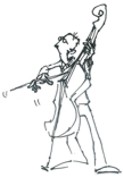

 |
 |
|||||||||||||
|

|
||||||||||||||||||||||||||||||||||
Recorded at the Kadima Studio, Jerusalem, May-July 2007.
Liner notes:
Origami (Ariel). Design and pattern are what distinguishes paper origami. The opening tune of the album also reflects pattern , in sharp contrast with some of the chaos of the subsequent tracks. Patterns turn out to be important in the solos of some of the other tunes as well, where they often replace chord progressions. Folanco (Ariel). Originally Ariel sang this tune and accompanied himself on guitar. The lyrics are in a private language that at times sounds like Spanish and at other times like Japanese. A version of this tune for vocals, bass, and piano was performed at the Jerusalem Conservatory, with Ariel playing the piano. This is the piano solo version created for this album. Caravan (D. Ellington). Ariel worked a lot on this version of Caravan and performed it live at many gigs, both solo and with bass. It has an unusual introduction of 16th notes, followed by a minimalist rendition of sand blown by desert winds and rearranged into oriental patterns. The solo shows the influence of Gonzalo Rubalcaba. Blues No. 7 (Ariel). This was a difficult tune to record, requiring many takes. It was like playing Mozart. A simple blues, Ariel alone with the piano, and no place to hide. The take that made it to the album turned out to be one of the less simple ones. Mr. JC (Ariel). Ariel wrote this tune for Jean Claude Jones, on his 57th birthday, and performed it for the first time as a piano solo piece at a Kadima salon held the same day. Since then he has played it with Mr. JC himself at various gigs, but here we have the original solo version. This brooding, melancholy tune grew out of one of its licks in the solo. Giant Steps (J. Coltrane). Ariel’s initial intention was to do Giant Steps in 7/8ths, until he stumbled upon Kenny Garrett’s version and discovered that KG had done just that. He experimented for a while with 5/4ths and 11/8ths, and finally settled on straight 4/4ths in two keys, with a change in time at the very end. Joy of Latin (Ariel). This is a sample from Ariel’s collection of Latin tunes. It was conceived as a duet for piano and bass. Initially Ariel intended to overdub a bass line, but ended up doing it all in one fell swoop. Free Improvisation (Ariel). This is an entirely free improvisation, approached without any preconceived ideas in mind, and letting the keys lead the pianist. It is what’s been going on at the Kadima salons, where Ariel got his first taste of free jazz. On the surface, the method is simple: approach with an empty head and hold on to the ideas that emerge. The results are often unexpected. Eleanor Rigby (J. Lennon & P. McCartney). Ariel hasn’t taken in much Beatles, and the first time he heard this tune was in the street, coming from the loudspeakers of an outdoor cafe. He stopped to listen for a minute or so. The following day he heard a recording of Ray Charles. He then came up with his jazzed up version on the spot, pretty much along the lines that ended up on this album. The Note (Ariel). The album, which started on a calm note, closes with an energetic one, in one of Ariel’s favorite minor keys. |
|||||||||||||||||||||||||||||||||||